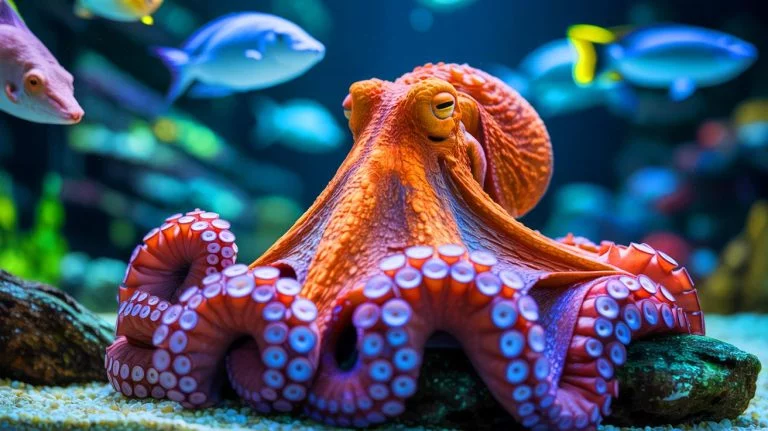| IN A NUTSHELL |
|
The emergence of the world’s first commercial octopus farm has sparked a heated debate across the globe. Proposed by Nueva Pescanova, a Spanish seafood company, this initiative aims to mitigate declining wild octopus populations through aquaculture. However, the ethical implications and environmental impact of farming such intelligent creatures have raised significant concerns. Scientists, lawmakers, and the public are divided over the morality and necessity of this venture. This article examines the complexities involved in octopus farming, highlighting the ethical issues, scientific insights, and the international response to this controversial development.
The Intellectual Marvels of Octopuses
Octopuses are fascinating creatures, often regarded as a form of intellectual marvel in the marine world. Their cognitive abilities are comparable to those of some mammals, boasting approximately 500 million neurons. This neural complexity is not centralized in a single brain but spread throughout their bodies, allowing for autonomous arm functions. Such a setup enables octopuses to engage in complex problem-solving and tool use.
Numerous studies document the extraordinary intelligence of octopuses. For example, an octopus named Otto, residing in a German aquarium, achieved notoriety by disrupting the facility’s power supply through a calculated act of squirting water. This incident highlighted their capacity for problem-solving and even expressing annoyance. Additionally, octopuses have been witnessed constructing dens and opening jars, showcasing their dexterity and inventive nature. These behaviors contribute to the contentious debate surrounding the ethical implications of farming such intelligent beings.
Ethical Concerns and Animal Welfare
The ethical concerns regarding octopus farming are deeply intertwined with their demonstrated sentience. A comprehensive review by the London School of Economics concluded that octopuses can experience pleasure and pain. This finding led the UK government to extend animal welfare protections to octopuses, making them the sole invertebrates with such legal recognition. This underscores the need for ethical consideration in their treatment.
Animal welfare advocates have criticized Nueva Pescanova’s proposed farming conditions. The plan to confine 10 to 15 octopuses per cubic meter contradicts their solitary nature, potentially inciting aggression and cannibalism. Additionally, the method of using ice slurry for killing has been condemned as inhumane. Neuroscientists argue that such methods inflict unnecessary suffering on these cognitively advanced creatures. These concerns have fueled a broader debate on the morality of industrial farming practices.
The Global Backlash and Legislative Actions
The global response to Nueva Pescanova’s initiative has been swift and vocal. In the United States, Washington state has already enacted a ban on octopus farming, citing ethical and economic concerns. Federal legislation, known as the OCTOPUS Act, has been introduced to prohibit octopus farming nationwide and block imports of farmed octopus. This legislative momentum reflects a growing recognition of octopuses as intelligent, sentient beings that should not be subjected to commercial farming.
Internationally, the backlash is gaining traction. The European Union is under pressure to reconsider the Spanish facility’s operations, given the recognized sentience of octopuses. Public protests have erupted in Madrid, signaling widespread opposition to what many perceive as an expansion of animal cruelty. As awareness of octopus intelligence and suffering spreads, calls for ethical treatment and conservation efforts are resonating globally.
Scientific and Environmental Implications
Nueva Pescanova argues that octopus farming could alleviate pressure on wild populations. However, the environmental and scientific implications remain contentious. Octopuses are carnivorous, requiring significant fish resources for meat production. This raises concerns about the sustainability of farming such predatory species, as it could exacerbate existing pressures on already depleted fish stocks.
The scientific community also grapples with the moral implications of farming intelligent beings. The recent documentary “My Octopus Teacher” highlighted the emotional depth and trust-building capabilities of octopuses. This challenges humanity’s perception of these creatures. As we uncover the genetic markers of intelligence shared between humans and octopuses, the question arises: Should we leverage this knowledge for industrial gains, or should we foster a deeper understanding and appreciation for these remarkable beings?
The controversy surrounding the world’s first octopus farm highlights a critical moment in our relationship with intelligent marine life. As scientific insights continue to reveal the remarkable cognitive abilities of octopuses, the ethical and environmental considerations of farming them become increasingly significant. With legislative actions and public protests gaining momentum, the future of octopus farming hangs in the balance. Will humanity choose to prioritize ethical treatment and conservation, or will commercial interests take precedence? The resolution of this question may shape our relationship with the natural world for generations to come.
Did you like it? 4.4/5 (27)








Wow, I never thought octopuses were so smart! 🐙
Is it really worth farming octopuses given their intelligence?
This is a moral disaster indeed. We should be protecting, not farming, such intelligent creatures.
I’ve always wanted to try octopus, but now I’m not so sure. 😬
Thank you for highlighting this issue. It’s important for us to be aware of the ethical implications. 🙏
Are there any viable alternatives to octopus farming that could help wild populations?
Using ice slurry sounds incredibly inhumane! They need to find a better method.
Is this really about conservation, or just profit? 🤔
Octopus Teacher was such an eye-opening documentary. Can’t believe we’re farming these intelligent beings now.
How can we stop this from happening worldwide?
Maybe we should start farming humans next since we have so much in common with octopuses. 😂
What kind of fish resources are needed for octopus farming?
Thanks for the article! More people need to know about this. 👍
How do the local governments in Spain feel about this farm?
I’m disappointed in humanity. We need to respect all creatures.
Doesn’t seem sustainable to farm a carnivorous animal. What are they thinking?
When will the EU make a decision on this?
Seems like another case of humans exploiting nature for profit. 😞
Can scientists create an alternative food source for farmed octopuses?
I’m skeptical about the so-called ethical concerns. Isn’t farming necessary for food security?
Octopuses are amazing! Why are we even considering farming them?
Hope the OCTOPUS Act passes in the US!
Is there a petition I can sign to support the ban on octopus farming?
Maybe we should focus on plant-based seafood alternatives instead?
Is this the first step towards farming other intelligent marine creatures?
How did Nueva Pescanova get approval for this project in the first place?
What’s next, dolphins and whales farms? 😡
Does the article mention what specific protests are happening in Madrid?
We need more awareness about the intelligence of these creatures.
I appreciate the balanced view in the article, but I’m still against the farm.
Are there any success stories of reversing such decisions through public pressure?
How do we differentiate between farming octopuses and other animals? Is intelligence the only factor?